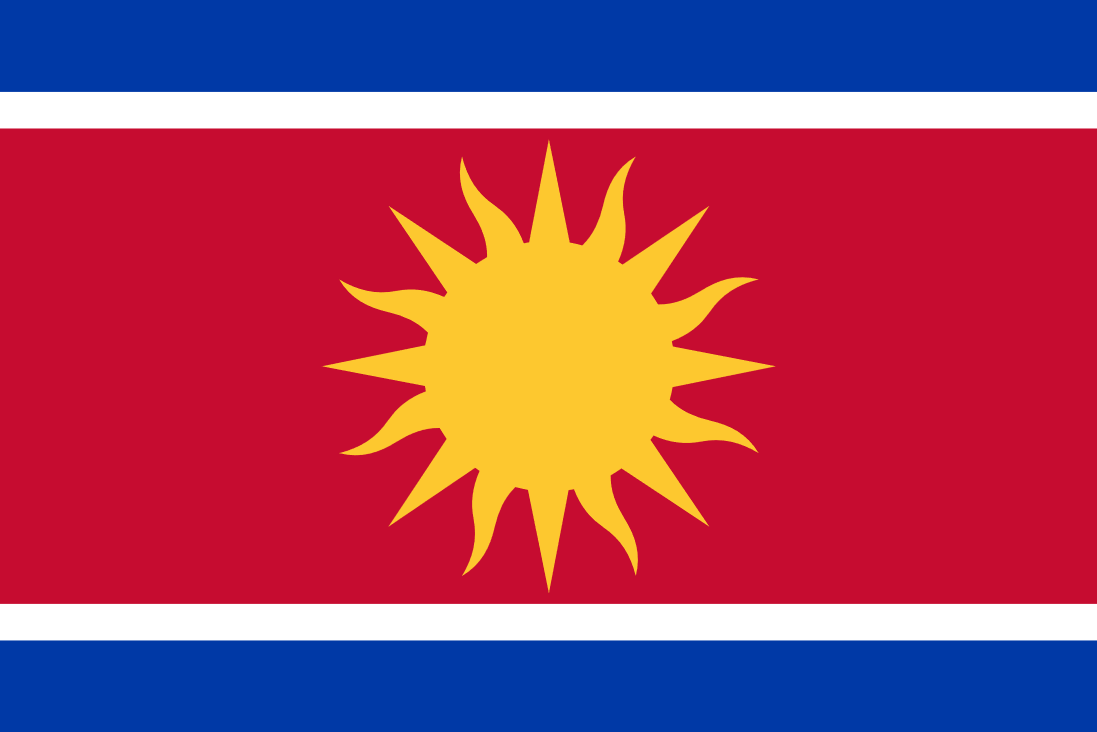Akarean Union
The People's Democratic Union of Akarean States 福国诸州人民民主联邦 | |
|---|---|
| Motto: 蓝天 金日 满地红 Blue Sky, Gold Sun, Wholly Red Earth | |
| Anthem: The Labourers' Call to Arms | |
| Status | Current |
| Capital | Fujing 8'11°S 96'31°E |
| Official languages | Mandarin, Hykkogwa, Gaanglanglataal |
| Other common languages | Oseanian, Edofasian |
| Ethnic group(s) |
|
| Demonym(s) | Akarean
|
| Government | Federal parliamentary socialist democracy |
• Governor | Sun Lu-Tsi |
• Deputy Governor | Masayoshi Kurosawa |
| Legislature | The Great Assembly |
| Establishment | |
• The Labourers' Revolution | 1919 - 1922 |
• The Great Referendum | April - August 1923 |
• The Acts of Union | November & December 1923 |
| Population | |
• 2015 census | |
| Currency | Yuan Currency code |
| Time zone | West Akarea Time Fujing Time Hautsing Time |
| Calling code | +86 |
| Country code | AKU |
| Internet TLD | .ak |
The Akarean Union (Akarean Mandarin: 福国联邦; Fúguó Liánbāng or 福国; Fúguó), officially the People's Democratic Union of Akarean States (福国诸州人民民主联邦; Fúguó Zhùzhōu Rénmín Mínzhǔ Liánbāng) is a country straddling the equator in Akarea. It is a union of the governments of six or seven nation-states, almost all of the former territories of the Akarean Empire: Great Huan, Fujing (which is both a constituent state and part of Great Huan), Suiland, Gaanglanglataar, Bantang and West Satoyama. It has land borders with Cenaesia to the north and the Republic of Satoyama east of West Satoyama on the island of Satoyama, and maritime borders with Hykko, Candanadium (Hautsing) and Meltor. As the most populated and most densely populated nation, the largest export economy and one of the largest standing militaries in the world, the Akarean Union is considered one of the great global superpowers.
The capital of Akarea is Fujing. Although Fujing is physically located within Great Huan, it is considered its own state for administrative purposes as the Grand Assembly where the delegates of Akarean states meet is located there, thereby necessitating a certain degree of geopolitical neutrality. Fujing is the most populated and most densely populated city in the world, with some areas reaching the equivalent of 1.3 million people per square kilometre. The terrain of Akarea varies from lowland plains and rolling hills to jungles, rugged coastlines, steep mountain ranges and high plateaus. The northern two-thirds of Great Huan and the entirety of Suiland lie on the South Kaltach Fault, which makes these regions prone to destructive earthquakes and tsunamis.
The first known human inhabitants in Akarea date back several million years, in the Yáolán or "Cradle" immediately south of the Cenaesian Mountains. By the 3rd millennium BCE, the earliest dynastic civilisations had emerged along the fertile coastlines of the southernmost peninsula of the Kaltachian continent. The events of Year 0 led to a breakdown in the authority of these dynasties, leading to the Era of Warring States which would last for over five centuries. When early irrigation methods were discovered by farmers of the Huan dynasty around 400 CE, Huan's ability to feed its troops and their families reliably directly led to a vast strategic and manpower advantage over the other states, leading to a decisive Huan victory as the dynasty overtook the entire peninsula, establishing Great Huan. Over the next 1000 years, the Huan emperors would continue to expand, developing one of the earliest navies in the world and embarking on the Nine Great Campaigns which saw the occupation of neigbouring nations Gaanglanglataar, Satoyama, Suiland, Hautsing and a significant portion of Hykko, now spanning the entire region of Akarea and morphing into the Akarean Empire.
After being introduced to Candanadium around the 1760s, the thrones of the Akarean Empire and Candanadium became formal allies, and trade routes were established between Akarea and Kaltachia. The status quo held for quite some time, leading to the Great Cultural Era in which the arts, sciences and humanities grew considerably, even spilling overseas. Following the Industrial Revolution in the Akarean Empire, civil unrest grew as workers grew dissatisfied with long hours and poor pay. They formed the People's Army and started The Labourers' Revolution, fighting for two years against imperial resistance before sieging the Grand Imperial Palace, culminating in the Grand Rebellion where almost one million civilians torched the palace to the ground and shot the emperor Zhou Huan in what is considered to be the most attended public execution in history. The surviving royalty and noblemen fled Akarea, leaving the People's Army victorious and now in control of all the former territories of the Empire. They immediately disbanded the Empire and founded a new socialist union, extending invites to all the former territories. All accepted this invitation except for mainland Hykko who formed their own sovereign state and Satoyama of which its eastern half formed an independent republic.
The Akarean Union is a unicameral parliamentary democracy; elected delegates from the Akarean States meet in the Grand Assembly to discuss local and national issues. Akarea's system of Market Socialism is defined in the People's Definition of the New Akarean State, and the Union's Constitution protects it, stating that workers control the means of production and the enterprise which stems from it. The currency of Akarea is the Yuan (lit. "Unit") as part of the People's Definition of the New Akarean Economy in which the structure of a Renminbi or People's Currency is outlined. The Akarean Union is not a member of either the Kaltach Union or Terran Commonwealth, though it has formal relations with both Candanadium and Edofasia - the principal members of these unions respectively - which has been a point of contention throughout the Akarean Union's contemporary geopolitical history. Akarea is known for its cuisines, both traditional and pop culture, and contains nearly 100 designated world heritage sites, the most of any non-aligned nation.
Etymology
The name of the Akarean Union derives from the name of the Akarean Empire, which itself derives from the name of the region of Akarea. The two names are not directly related largely due to the historic isolationism of the region, which itself can be attributed to the challenging geography surrounding the region as well as historical Akarean sailing technology being targeted towards traversing the Danpian rather than open ocean.
Native name
The native name Fuguo (福国, lit. "Blessed Country") derives from the name given to the region by the emperors of the Huan Dynasty, the largest, longest lasting and last of the Akarean dynasties. While Guo (国) literally means "Country", Fu (福, lit. "Blessing") as the name given to the region is said to have stemmed from the Huan belief that the imperial expansionism of Akarea was both a blessing to itself through the acquisition of the riches of the lands occupied, but also a blessing to what they perceived to be less civilised peoples by introducing them to their high culture. Over time, Fu became less associated with its literal meaning and more as a general name of the region. Contemporarily, despite awareness of Fu's origins, the name was kept as the argument was made that the Labourers' Revolution was a blessing to the proletariat of Akarea, as well as Fuguo being an already established and recognised name.
International name
The name Akarea was given to the region by Candanadian journalists during the Sixth Great Campaign which established the relationship between the Akarean Empire and Candanadium. Following the establishment of the Empire as the Huan Dynasty underwent the Nine Great Campaigns, the empire was referred to as the Akarean Empire internationally based on this given name. The namesake stayed when the Empire was disbanded and the Union was founded in its place.
History
Main articles: History of the Akarean Union, History of the Akarean Empire, List of Akarean Dynasties, The Labourers' Revolution, The Eight Acts of Union
This section needs expansion. You can help by adding to it or discussing it. |
Geography
This section needs expansion. You can help by adding to it or discussing it. |
Government & Politics
This section needs expansion. You can help by adding to it or discussing it. |
Economy
This section needs expansion. You can help by adding to it or discussing it. |
Infrastructure
This section needs expansion. You can help by adding to it or discussing it. |
Demographics
This section needs expansion. You can help by adding to it or discussing it. |
Culture
This section needs expansion. You can help by adding to it or discussing it. |
Notes
No notes


